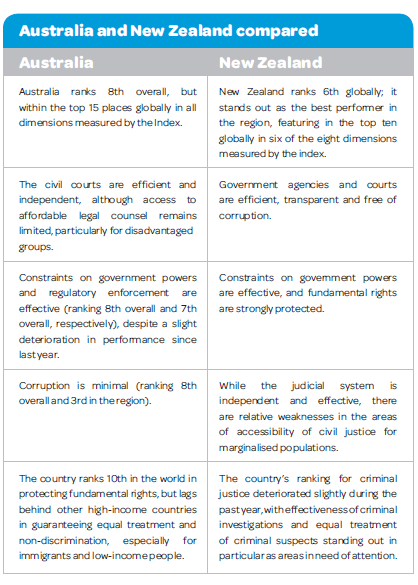Australia has come out in the top ten in a far-reaching survey that measures the justice systems of 99 countries – but it failed to beat its Kiwi counterparts.
The
World Justice Project Rule of Law Index 2014 is a 200-plus page research paper that aims to portray the rule of law as seen through the eyes of those who use the justice system around the world.
It ranks countries according to multiple indicators, including constraints on government powers, absence of corruption, open government, fundamental right, order and security, regulatory enforcement, civil justice and criminal justice.
Of the 99 countries that appeared in the results, Australia came eighth, losing out to New Zealand by two places.
Denmark ranked first, while Venezuela came in last place.
This week, global provider of legal, government, corporate information and research
LexisNexis released a newsletter,
Advancing Together: Rule of Law Updates and Perspectives from the Asia Pacific, that broke down and explored the Australian and New Zealand results of the index.
These two countries were the best overall rule of law performers in the region, the newsletter says.

LexisNexis executive director in New Zealand Rachel Travers told
Australasian Lawyer that although the Pacific region is identified as outperforming the rest of the world, the upkeep of the rule of law is crucial, even in developed regions.
“Because as soon as access to the rule of law is threatened, a countries laws, or the people will suffer from unfair work conditions, unacceptable political pressure or a derogation of their human rights.”
The WJP survey also revealed that there was an upward trend in order and security in many countries, which shows that the rule of law is advancing in many parts of the world, she says.
“The Pacific region is identified as outperforming the rest of the world in most categories of the WJP study which is fantastic news for our region and something that we can be proud of,” Travers adds. “Australia followed closely behind New Zealand in the WJP results so we can be proud as a region that we are performing well on the world stage.”
David Hillard, pro bono partner at national Top Tier
Clayton Utz, told
Australasian Lawyer that the high ranking of Australia and New Zealand confirms the strong democratic and civil traditions of both countries.
But he says there are obviously areas where Australia should be doing better.
“For lawyers involved extensively in Pro Bono practice, it was no surprise that the measure on which Australia scored lowest was ‘Civil Justice’, which included the key feature of whether ordinary people can access and afford civil justice,” he says.
“Equality of access to the law for all Australians is an essential underpinning of our democracy and the rule of law. However the World Justice Project noted that in Australia ‘access to affordable legal counsel remains limited, particularly for disadvantaged groups’.”
Hillard says a continuing problem is that in the vast majority of instances of people seeking advice and representation in civil matters, including in employment law matters, those who might be expected to meet the socio-economic criteria for legal aid in fact are not legally aided.
He points to a recent statement from the Productivity Commission, which noted in its draft report into Access for Justice Arrangements in Australia that, “more resources and more efficient and effective practices by legal assistance providers are required to better meet the legal needs of disadvantaged Australians”.
*Australia and New Zealand comparitive chart courtesy of the LexisNexis newsletter, based on the WJP Rule of Law Index.

